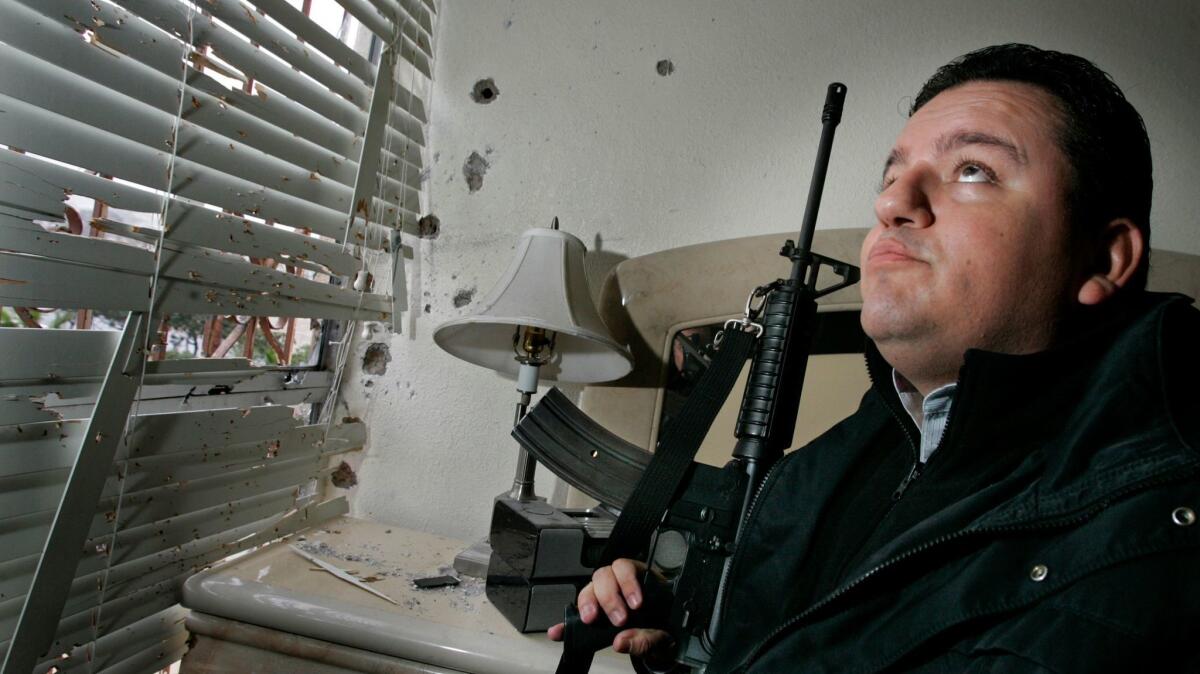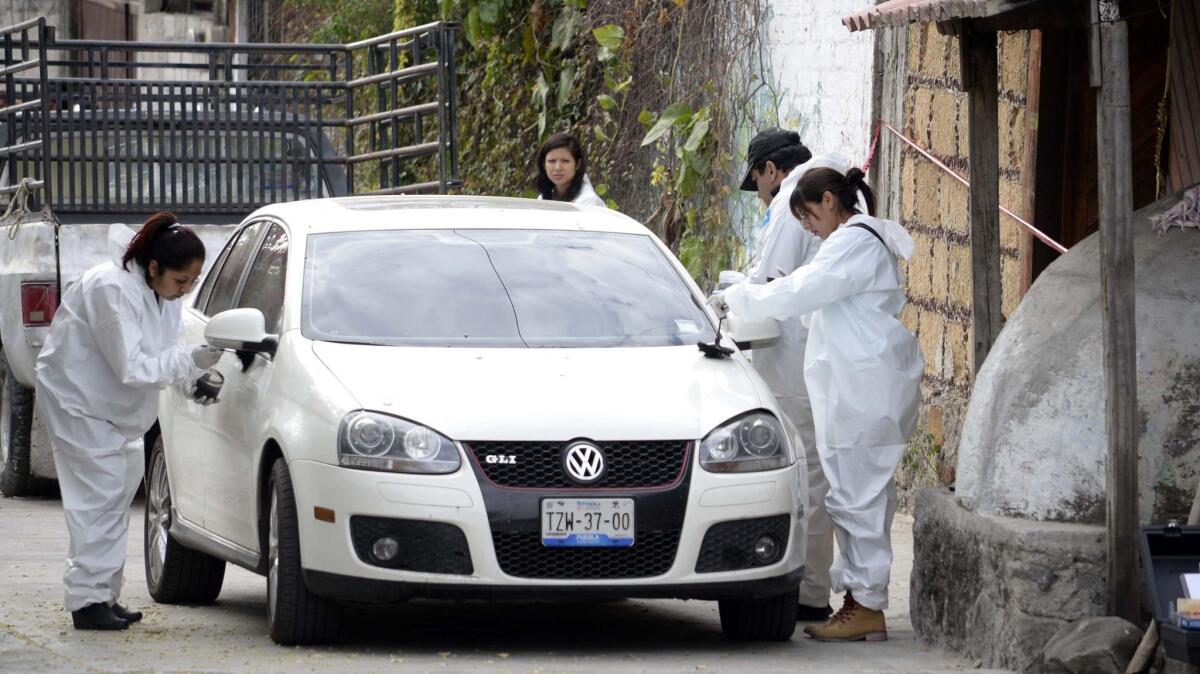Mexico’s ‘Temixco Massacre’ left 4 women and 2 children dead, raising questions about police tactics

- Share via
Reporting from Temixco, Mexico — The sealed-off house on a residential street here yields little trace of the recent bloody events inside.
Crime scene tape stretched across the imposing black metal gate — and the cop cruiser stationed outside — cannot convey what went catastrophically amiss during a police operation at 238 Francisco I. Madero St.
Shot dead during the botched assault were six family members — four women and two children, including a 3-month-old girl, the latest collateral damage in Mexico’s drug wars.
All were kin of the home’s principal resident, Jose Antonio Valdez Chapa, whom police here call a smuggling kingpin — an allegation his family denies. He was not injured in the raid.
The Mexican press labeled the Nov. 30 incident the “Temixco Massacre,” after this gritty suburb of 115,000 adjacent to the picturesque tourist haven of Cuernavaca, two hours south of Mexico City.
The case has emerged as a human rights rallying cry and the latest black mark against Mexican police in the country’s protracted struggle against criminal gangs.
Authorities say the victims died in crossfire as police fired in self-defense.
But relatives of the dead and their attorney accuse the police of mounting an unprovoked attack on a sleeping family — firing more than 100 bullets with the clear intent of taking down Valdez, long a marked man here. They insist that no one inside was armed.
Mexico’s ill-trained, poorly paid and corruption-plagued police have long been a point of vulnerability in the country’s raging drug wars, though many police have been killed in the line of duty.
That’s why Mexico’s Congress this month doubled down on deployment of the military against organized crime despite vociferous objections from human rights activists and others. Critics say soldiers and marines are ill-suited for law enforcement duties and just as likely as police to be in cahoots with traffickers, or to shoot first and ask questions later.
“No one in my family fired, we were all inside, we told [the police] not to shoot, that they had already killed my mother, my grandmother and children,” Juan Carlos Valdez Rodriguez, 17, son of the reputed drug lord and a survivor of the raid, told reporters.
He recalled his sister’s stunned lament that her 3-month-old baby, who had yet to be named, had been shot while in her arms.
“They hit my daughter,” Valdez remembered his sister repeating. “My baby is dead.” Moments later, she too was fatally shot.
Photos of the aftermath show a blood-spattered toilet flanked by the tattered corpses of four women who apparently sought shelter in the bathroom.
Police have provided contradictory versions of what happened leading up to the bloodbath in Temixco, a city that, like others in central Morelos state, has seen considerable violence.
Last year, the town’s newly installed mayor, Gisela Mota, was shot to death at her home a day after she took office on Jan. 1., part of a nationwide wave of mayoral assassinations. Officials blame criminal syndicates.

The National Human Rights Commission, a nongovernmental group, has launched an investigation into the November operation, labeling the incident a possible extrajudicial killing and “crime against humanity.”
A central figure in the sanguinary debacle is Jose Antonio Valdez Chapa, whom relatives describe as a legitimate businessman dedicated to the purchase and resale of luxury vehicles.
But police here know him as El Señor de la V. (roughly, “Mr. V”), a purported trafficker with links to gangs, including the Jalisco New Generation cartel, considered among the country’s most violent. According to police files cited in media reports here, Valdez began his criminal career in his native Guerrero state as a leader of a criminal band called Los Rojos (“The Reds”), notorious for kidnapping, robbery, drug trafficking and other crimes.
Those slain on Nov. 30 included Valdez’s wife, mother, sister, daughter and granddaughter, the 3-month-old.
Eight people, four of them minors, survived the shooting. Valdez and four other survivors, including his 17-year-old son, were arrested. But a judge later ordered all five released, citing a lack of evidence that they attacked police.
The family lawyer, Juan Manuel Cuellar, said in an interview that gunshot residue tests presented to the court demonstrated that no one inside had fired a weapon. Family members say that two guns found in the house — a .32-caliber pistol and 9-millimeter handgun — were planted, an allegation denied by police.
Nor are there any known pending charges against Valdez, the attorney said, despite the police depiction of him as a ruthless drug capo. The objective of the raid remains a matter of dispute and confusion.
Police deny they targeted Valdez — even though it was the third time in two years that authorities raided a residence where he was living, according to relatives and media reports.
A December 2015 shootout at a home in Cuernavaca killed a state police officer and left Valdez’s brother dead, but Valdez reportedly escaped. A January 2017 police raid at the same Cuernavaca address resulted in Valdez’s arrest on weapons and other charges, but he was released after three months, according to media accounts here.
The initial police version of the November operation stated that a group of sicarios, or professional killers, had attacked the house on Madero Street shortly before 3 a.m. Soon, though, officials acknowledged that police, not paid assassins, had descended on the home, spurred by an anonymous tip that individuals were being held in the house against their will.
That afternoon, the Morelos state security commissioner, Alberto Capella Ibarra, told reporters that police opened fire after gunmen fired on them first.
No police officer was seriously wounded, authorities said, though one took a bullet in his flack vest. The shooting went on for 15 to 20 minutes, neighbors say. No captives were found.
Capella has long been a figure of controversy. He was both hailed as a relentless crime fighter and denounced for alleged police abuses while security chief in the violence-ridden border city of Tijuana. Capella has a similarly mixed record since assuming the security portfolio in Morelos in 2014.
Publicly, Capella has defended the police actions in the November incident, but vowed to investigate thoroughly.
In a radio interview, Capella said his conscience would not permit him to countenance any excess of authority. “We are the police who safeguard lives as our fundamental premise,” he said.
The office of Capella declined an interview request from the Los Angeles Times.
The Valdez family views the raid not as a rescue gone awry, but as the latest attempt by police, orchestrated by Capella, to capture or kill Valdez.
Juan Carlos Valdez Rodriguez, the teenage son, said that when he and other survivors were arrested, one policeman asked, “What did you do to Capella to make him so mad at you?”
Days after the shooting, a group of protesters, mostly women, appeared on the streets of Temixco bearing white signs with a pointed message: “Capella, how much did they pay you for my life? I was only 3 months old.”
Relatives of the dead and others here are demanding an independent investigation.
“Everything the police say is full of inconsistencies,” said Luis Preciado, 28, who was engaged to marry Valdez’s sister, Maria del Rosario Valdez Chapa, 27. She was among those killed. “They are covering up.”
He said his terrified fiancee called him on her cellphone that morning as she and others sought refuge in the bathroom.
“I could hear the shouts, I could hear the bullets,” Preciado recalled during an interview. “They were shouting and imploring, ‘Please! Stop! Stop the shooting!’ ”
State police officers who spoke anonymously to Mexican media insisted that they initially had no idea that Valdez was in the house. They said they also were unaware of the women and children, and never heard their screams.
“We are all human, we are very sorry about what happened inside,” an officer told Milenio Television. “I am sure that if … anyone had told us there were children [inside], the story would have been different.”
Now, the officers say they fear for their lives. So-called narco-banners have appeared in town naming the lawmen involved and offering a reward of 100,000 pesos — about $5,000 — for their heads.
Cecilia Sanchez of The Times’ Mexico City bureau contributed to this report.
Twitter: @PmcdonnellLAT
More to Read
Sign up for Essential California
The most important California stories and recommendations in your inbox every morning.
You may occasionally receive promotional content from the Los Angeles Times.












